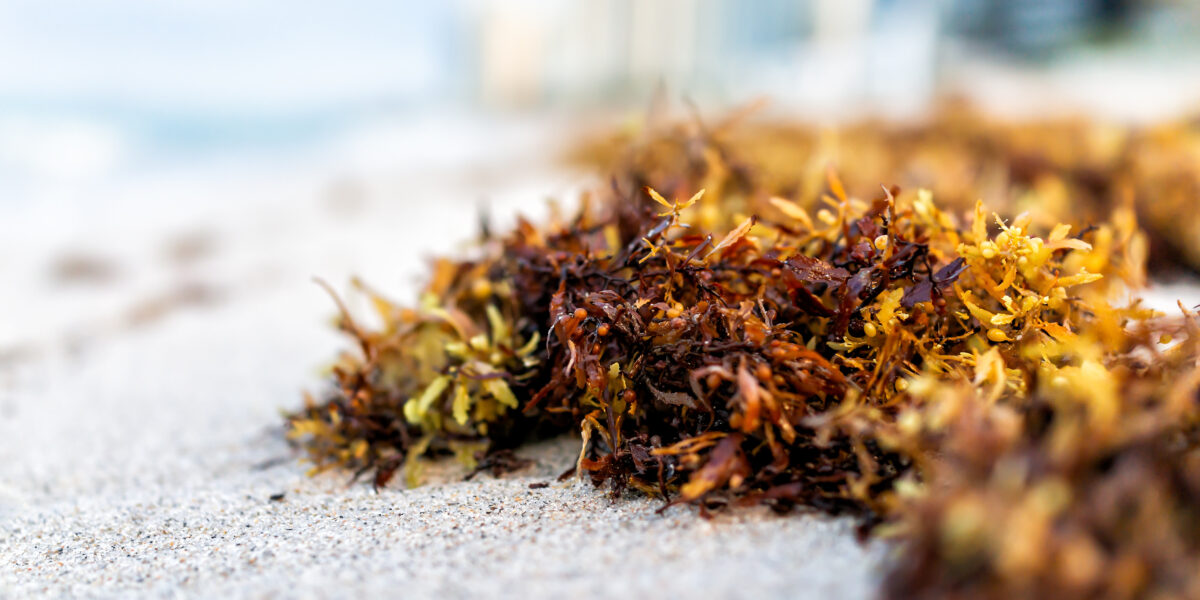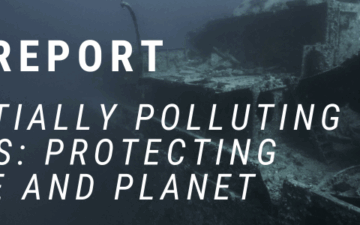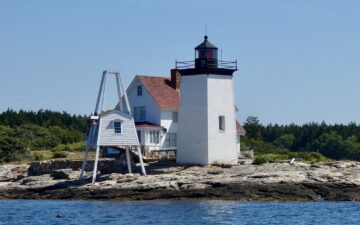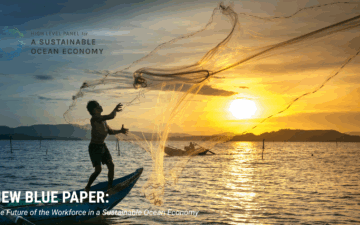
Washington, D.C., August 18th 2021 – Over the past decade, the Caribbean region has witnessed the massive inundation of nuisance sargassum, a type of macroalgae washing up on shores in alarming quantities. The effects have been devastating; strangling tourism, releasing carbon dioxide back into the atmosphere and disturbing coastal ecosystems throughout the entire region. The Caribbean Alliance for Sustainable Tourism (CAST) has documented some of the most harmful effects, both environmentally and socially, including a reduction in tourism by nearly one third, on top of thousands in additional costs for removal once it shows up on beach fronts. St. Kitts and Nevis, in particular, are predicted to be hit hard this year by this new phenomenon.
While the seaweed-centered ocean farming market for repurposing activities is already valued at USD14 billion, and growing every year, sargassum has largely been left out due to the unpredictable nature of supply. One year it might appear in massive quantities in Puerto Rico, the next year might be St. Kitts, the following year might be Mexico, and so on. This has made investment in large-scale infrastructure difficult. That’s why The Ocean Foundation partnered with Grogenics and AlgeaNova in 2019 to pilot a low-cost method to collect sargassum before it even reaches the shore, and then repurpose it locally for organic agricultural practices. Following the successful implementation of this pilot project in the Dominican Republic, The Ocean Foundation and Grogenics have entered a partnership with The St. Kitts Marriott Resort & The Royal Beach Casino to facilitate sargassum removal and insetting in collaboration with Montraville Farms in St. Kitts.
“Through the partnership, St. Kitts Marriott Resort & Royal Beach Casino hope to complement the existing efforts of The Ocean Foundation and Grogenics. Simultaneously, this will support the St. Kitts agricultural sector utilizing natural resources from both land and water, enhance farm to table food offerings and generate future employment opportunities. A positive step for all stakeholders and surrounding communities. The St. Kitts Marriott Resort & Royal Beach Casino also plan to support the initiative with anticipation of available produce to supply the resort.”
Anna McNutt, General Manager
St. Kitts Marriott Resort & Royal Beach Casino
As large-scale sargassum strandings become a recurring stressor, coastal areas are being put under increasing pressure with severe consequences for shoreline stability and other ecosystem services, including carbon sequestration and storage. The problem with current landings comes with the disposal of the large tonnage of collected biomass, bringing up other costly issues of transportation and environmental impacts. This new collaboration will focus on capturing sargassum near and on shore and then repurpose it by combining with organic waste, enhancing nutrient content while sequestering carbon dioxide. We will combine sargassum with organic waste to transform it into fertile organic compost, and create other advanced bio-fertilizer.
“Our success will be in helping to create alternative livelihoods for communities – from sargassum collection to composting, distribution, application, agriculture, agroforestry, and carbon credit generation – to reduce social vulnerability, increase food security and enhance climate resilience throughout the Caribbean Region,” says Michel Kaine of Grogenics.
This project will help minimize impacts on the tourism and hospitality industry, while increasing local food security and mitigate climate change by sequestering and storing carbon in agricultural soils. In St. Kitts and Nevis, less than 10% of the fresh produce consumed on the islands is grown locally and agriculture accounts for less than 2% of GDP in the Federation. Through this project we aim to change that.
Montraville Farms will utilize this repurposed sargassum for local organic farming.
“St. Kitts and Nevis, while being one of the smallest nations, has a long and rich history in agriculture. Our aim is to build upon that legacy, positioning the country once again as a mecca for sustainable food production and efficient production techniques in the region,” says Samal Duggins, Montraville Farms.
This project builds off of the initial partnership forged between The Ocean Foundation and Marriott International in 2019, when Marriott International provided the seed funding for TOF to launch a pilot project in the Dominican Republic, in coordination with Grogenics, AlgaeNova and Fundación Grupo Puntacana. The pilot project yielded remarkable results, helping to prove the concept to other supporters, and paving the way for The Ocean Foundation and Grogenics to expand this work throughout the Caribbean. The Ocean Foundation will continue to double down on investments in the Dominican Republic in the coming years while identifying new communities to collaborate with, such as St. Kitts and Nevis.
“At Marriott International, natural capital investments are a critical part of our sustainability strategy. Projects such as this, that not only restore affected ecosystems, but mitigate the impacts of climate change and benefit the local community through increased economic vitality, are exactly where we will continue to direct our efforts.”
DENISE NAGUIB, VICE PRESIDENT, SUSTAINABILITY & SUPPLIER DIVERSITY
MARRIOTT INTERNATIONAL
“Through this project, TOF is working with a unique consortium of local partners – including farmers, fishers, and the hospitality industry – to develop a sustainable business model that addresses the sargassum crisis while protecting coastal ecosystems, increasing food security, creating new markets for organic produce, and sequestering and storing carbon through regenerative agriculture,” says Ben Scheelk, Program Officer for The Ocean Foundation. “Highly replicable and rapidly scalable, sargassum carbon insetting is a cost-effective approach that enables coastal communities to turn a major problem into a real opportunity that will contribute to the growth of sustainable blue economies throughout the Wider Caribbean Region.”
Benefits of Sargassum Insetting:
- Carbon Sequestration by focusing on regenerative development, this project can help reverse some of the effects of climate change. Grogenics’ organic compost restores living soils by putting a massive amount of carbon back into the soil and plants. By implementing regenerative practices, the end goal is to capture many tonnes of carbon dioxide as carbon credits that will generate extra income for farmers and allow resorts to offset their carbon footprint.
- Supporting Healthy Ocean Ecosystems by relieving pressure on marine and coastal ecosystems through the harvesting of harmful sargassum blooms.
- Supporting Healthy and Livable Communities by growing an abundance of organic food, local economies will prosper. It will lift them out of hunger and poverty, and the extra earnings will ensure that they can thrive for generations to come.
- Low Impact, Sustainable Solutions. We enlist sustainable, ecological approaches that are straightforward, flexible, accessible, cost effective and scalable. Our solutions can be applied in a variety of contexts with different blended finance models to ensure long-term sustainability in addition to delivering immediate environmental, social, and economic benefits.
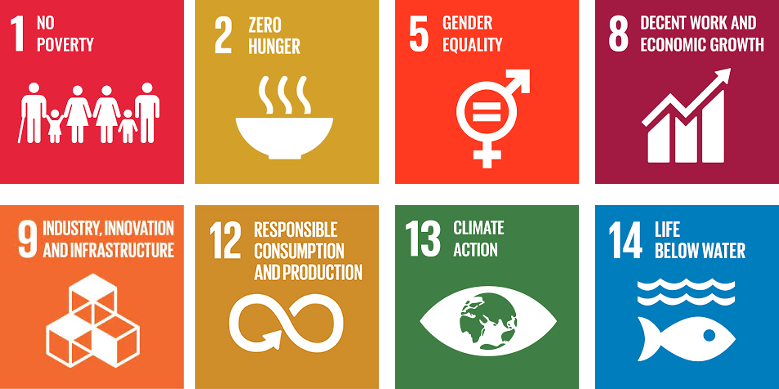
About The Ocean Foundation
As the only community foundation for the ocean, The Ocean Foundation’s 501(c)(3) mission is to support, strengthen, and promote those organizations dedicated to reversing the trend of destruction of ocean environments around the world. We focus our collective expertise on emerging threats in order to generate cutting edge solutions and better strategies for implementation. TOF executes core programmatic initiatives to combat ocean acidification, advance blue resilience and address global marine plastic pollution. TOF also fiscally hosts more than 50 projects across 25 countries and began working in St. Kitts in 2006.
About Grogenics
Grogenics’ mission is to steward the Ocean by relieving pressure on marine and coastal ecosystems through the harvesting of harmful sargassum blooms to conserve the diversity and abundance of marine life. We do this by recycling sargassum and organic waste into compost to regenerate soils, thereby putting massive amounts of carbon back into soil, trees and plants. By implementing regenerative practices, we also capture several metric tonnes of carbon dioxide that will generate extra income for the farmers and-or resorts through carbon offsets. We increase food security with agroforestry and bio intensive agriculture, enlisting modern, sustainable techniques.
About Montraville Farms
Montraville Farms is an award-winning, family-owned business and farm based in St. Kitts, which utilizes sustainable agro-technology, infrastructure and methods aimed at advancing the food and nutrition security agenda in the region, while promoting education, skill development, job creation and people empowerment. The farm is already one of the Federation’s top producers of specialty breeds of leafy greens and is currently expanding their operations on the island.
The St. Kitts Marriott Resort & The Royal Beach Casino
Perfectly situated on the sand beaches of St. Kitts, the beachfront resort offers an exclusive experience in paradise. Guest rooms and suites offer breathtaking ocean views to stunning mountains; the balcony views will set the stage for a destination adventure. Whether you are on the beach, at one of their seven restaurants, unparalleled relaxation, renewal and warm service await you. The resort offers an array of amenities including an 18-hole golf course, onsite casino and a signature spa. Spend the ultimate tropical experience in one of their three pools, sip a cocktail at the swim-up bar or find a prime spot under one of their palapas where your unique St. Kitts escape to your getaway unfolds.
Media Contact Information:
Jason Donofrio, The Ocean Foundation
P: +1 (202) 313-3178
E: [email protected]
W: www.oceanfdn.org
